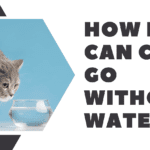Cats are naturally inquisitive creatures, so it shouldn’t come as much of a surprise when they start showing an interest in what we consume. You, the cat owner, may worry if it’s okay to feed your cat human food. Imitation crab is one such dish that intrigues many people. In this piece, we’ll investigate whether or not cats can eat imitation crab, and we’ll talk about the benefits and drawbacks of doing so.

1. Introduction
It is our responsibility as cat owners to give our feline friends a healthy and well-rounded food. Cats are obligate carnivores, meaning their bodies require a diet high in animal protein, yet they have been known to occasionally like treats like imitation crab despite this.
2. What is Imitation Crab?
Surimi, or “imitation crab,” is a processed fish meat seafood product. It’s made with white fish like Alaskan pollock and other stuff to make it taste and feel like crab. Starch, flavoring, and artificial coloring are common examples of such additives.
3. Nutritional Value of Imitation Crab
The reduced calorie and fat content of imitation crab makes it a popular choice among those looking for a healthier substitute for real crab. However, it can’t compare to the real thing when it comes to nutrients. Unlike its real-crab counterpart, imitation crab is deficient in protein and vital elements like omega-3 fatty acids, vitamins, and minerals.
4. Can Cats Eat Imitation Crab?
While some cats may appear interested in eating fake crab, doing so is not suggested. There are several elements in imitation crab that cats can’t digest since their digestive systems aren’t evolved to handle them.
Cats’ Dietary Requirements
To satisfy their specific dietary requirements, cats must eat a diet rich in animal protein. Essential amino acids, such taurine, are crucial for their health and are more readily available in meat than in imitation crab. Inadequate nutrition in a cat’s diet can lead to a host of ailments, including heart disease and dull fur.
Potential Risks of Feeding Imitation Crab to Cats
Artificial flavors, colors, and preservatives are common in imitation crab, which can be toxic to cats. Toxic reactions, allergic reactions, and gastrointestinal distress are all possible side effects of these compounds. As an added health risk, the high sodium level of imitation crab can be harmful to a cat’s kidneys and blood pressure.
5. Signs of Allergies or Intolerances in Cats
Seafood is one of the elements to which some cats may develop an allergy or intolerance. Keep an eye out for the following symptoms if you suspect an allergic response after feeding your cat imitation crab or any other food:
- Vomiting
- Diarrhea
- Itchy skin
- Excessive scratching
- Swollen face or paws
- Difficulty breathing
Seek professional medical advice from your veterinarian if your cat displays any of these signs.
6. Safe Alternatives for Cats
Safer options that meet your cat’s dietary needs should be used instead of imitation crab if you want to keep your cat healthy. The best option is high-quality cat food designed to support healthy feline development and maintenance of weight. Try to find alternatives that actually have some kind of animal protein in them, such chicken, turkey, or fish.
If you want to treat your cat to some seafood, it’s best to go with cooked fish that hasn’t been seasoned or otherwise processed. Make sure the fish is boneless, cooked all the way through, and presented in bite-sized pieces. The skin should be removed because it is often fatty and can cause gastrointestinal problems.
7. How to Introduce New Foods to Cats
It’s best to ease your cat into trying different foods to avoid any tummy trouble. Mix a modest amount of the new food in with their usual meal as a starting point. Incorporate more of the new meal while lowering the old food over the course of a week or two to ensure a smooth transition.
Keep an eye on your cat to see how he or she reacts to the new food. Stop giving the new diet and talk to your vet if any problems arise.
8. Conclusion
In conclusion, while cats may be interested in trying imitation crab, you should probably keep their appetites away from it. Cats have special dietary needs that can only be fulfilled by premium, well-balanced cat chow. In addition to lacking the necessary minerals, imitation crab may also contain compounds that are toxic to cats. Choose cooked fish or other safe options, and always check with your vet before making any changes to your cat’s diet.
FAQs
- What about genuine crab? Can cats eat it? Some cats may tolerate tiny amounts of cooked, simple crab meat, but you shouldn’t feed it to your cat on a regular basis. Due to the high salt content and the possibility of gastrointestinal upset, it is advised to check with your vet before feeding your cat any kind of actual crab.
- What are the advantages of providing a healthy diet for cats? Cats require specific nutrients to stay healthy and happy, and they can be provided by a well-balanced diet. It promotes robust development, muscle growth, and a glossy coat. In addition to preventing health issues, it helps avoid dietary deficits.
- Is it possible for cats to develop an allergy to seafood? Allergies to fish and other seafood are possible in cats. Consult a veterinarian to determine the precise allergen and make the necessary dietary adjustments if you observe any signs of allergy or intolerance, such as scratching, vomiting, or diarrhea.
- If my cat exhibits symptoms of food intolerance, what should I do? Your cat should see a vet if it develops symptoms of food intolerance including diarrhea or itchy skin. They can help you figure out why your cat is reacting negatively, and then suggest a hypoallergenic diet or other solutions.
- Are there any foods commonly eaten by humans that cats can safely consume? Even though a well-balanced cat food diet should come first, cats can safely consume small amounts of certain human foods. Boneless, cooked fish and chicken, as well as certain fruits and vegetables like pumpkin and blueberries, fall into this category. However, before feeding your cat table scraps, do your homework and talk to your vet.
Disclaimer:
At TheCatCare.org, we take great care to ensure that the information we provide is accurate, up-to-date, and reliable. However, it’s important to note that we are not medical advisors or licensed veterinarians, and the information we provide should not be considered a substitute for professional advice.

Franky Watson is a certified pet care specialist with over 10 years of experience working with animals of all kinds. He has a degree in veterinary science and is passionate about educating pet owners on how to provide the best possible care for their furry friends. In addition to writing articles on pet care topics, Franky Watson also volunteers at local animal shelters and fosters animals in need. When he’s not caring for animals, he enjoys hiking and spending time with her own pets, including two cats.





